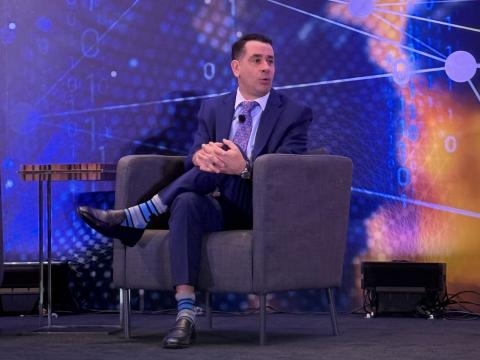Diversifying the Artificial Intelligence Market To Compete With China
Jack Corrigan, a senior research analyst at the Center for Security and Emerging Technology within Georgetown University’s Walsh School of Foreign Service, published a paper in May to urge U.S. policymakers to better diversify the artificial intelligence (AI) market, or risk falling behind China on AI innovation.
“In the years ahead, it will be critical for policymakers to focus their efforts on promoting AI market competition—namely, the process by which commercial firms vie against one another for dominance in AI,” Corrigan wrote. “Competition dynamics can significantly impact the rate, diversity and direction of innovation in a particular market, as well as the ways in which the costs and benefits of those innovations are distributed across society.”
While the United States is dedicated to leveraging AI technologies against adversaries, Corrigan’s concern is that the market isn’t diversified enough to foster the innovation needed to compete against countries like China.
As of now, the AI market is largely dominated by major companies such as Google, Amazon, Meta and Microsoft. And they continue to grow and eliminate competition by offering resources to startups that eventually become part of the larger corporation and controlling cloud computing infrastructure and data access.
“Without this sort of diversification, the U.S. AI sector risks becoming a ‘digital monoculture,’ a fragile ecosystem dominated by a few developers that produce nearly identical technologies and who suffer from similar vulnerabilities and blind spots,” Corrigan wrote.
Corrigan also pointed out not all corporate interests of the big AI technology companies align with U.S. national security priorities.
“For example, consider how many prominent AI firms have remained deeply integrated in China, even amid growing tensions between Beijing and Washington, and how some of those same firms have pushed back against U.S. policies to hamper China’s AI sector,” Corrigan added.
To stay ahead of international competitors, Corrigan suggested diversifying the innovation ecosystem with many different firms pursuing different types of products, and to achieve this, he suggested policymakers should support a competitive AI market that is easy for smaller companies to enter and exit.
To even the playing field for current cloud providers, policymakers could mandate interoperability between cloud environments so that customers wouldn’t have difficulties switching providers, or the federal government could provide a public option for cloud services.
“This public cloud would offer AI developers an alternative to the existing hyperscalers, giving them more freedom to reject any onerous terms and practices that those private providers might impose,” Corrigan wrote.
Another issue is that big firms also own the computing infrastructure, while other developers have to outsource those resources. To combat this, Corrigan suggested using antitrust enforcement to separate these companies’ cloud operations from the rest of their business, as well as promoting the development of less compute-intensive AI models.
Corrigan also wrote that supporting open models and enacting data portability requirements would give customers more options for buying AI products.
“By regulating against exclusionary conduct like bundling and self-preferencing, policymakers can help maintain a more open market in which AI developers compete for customers on the merits of their products rather than their ability to manipulate distribution platforms,” Corrigan wrote.
On top of creating policies to diversify the AI market, Corrigan said policymakers should research the benefits of small models and monitor the commercial AI landscape to determine the best competition-driving practices.
“Competitive markets are a key driver of technological innovation, incentivizing incumbent firms to continuously improve their offerings and empowering startups to bring disruptive new products to the market,” Corrigan wrote. “Promoting an open and competitive AI market would make the United States less vulnerable to economic disruptions, technological surprise and other national security risks.”





Comments